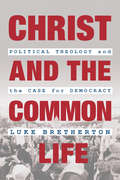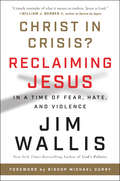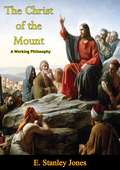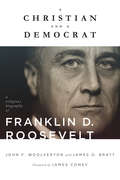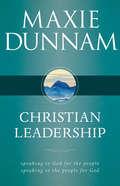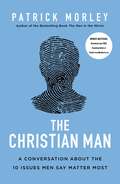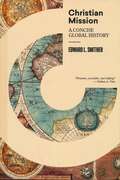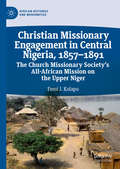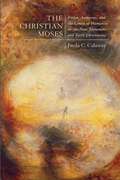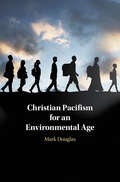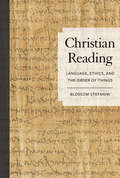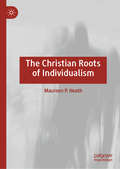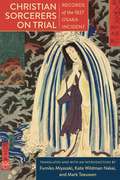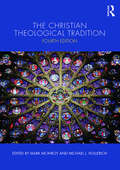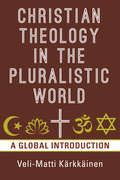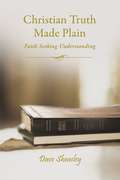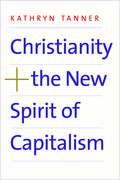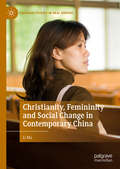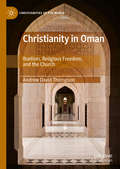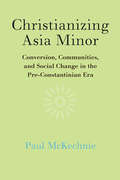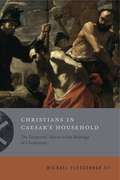- Table View
- List View
Christ and the Common Life: Political Theology and the Case for Democracy
by Luke BrethertonIn Christ and the Common Life Luke Bretherton provides an introduction to historical and contemporary theological reflection on politics and opens up a compelling vision for a Christian commitment to democracy.In dialogue with Scripture and various traditions, Bretherton examines the dynamic relationship between who we are in relation to God and who we are as moral and political animals. He addresses fundamental political questions about poverty and injustice, forming a common life with strangers, and handling power constructively. And through his analysis of debates concerning, among other things, race, class, economics, the environment, and interfaith relations, he develops an innovative political theology of democracy as a way through which Christians can speak and act faithfully within our current context.Read as a whole, or as stand-alone chapters, the book guides readers through the political landscape and identifies the primary vocabulary, ideas, and schools of thought that shape Christian reflection on politics in the West. Ideal for the classroom, Christ and the Common Life equips students to understand politics and its positive and negative role in fostering neighbor love.
Christ and the Common Life: Political Theology and the Case for Democracy
by Luke BrethertonIn Christ and the Common Life Luke Bretherton provides an introduction to historical and contemporary theological reflection on politics and opens up a compelling vision for a Christian commitment to democracy.In dialogue with Scripture and various traditions, Bretherton examines the dynamic relationship between who we are in relation to God and who we are as moral and political animals. He addresses fundamental political questions about poverty and injustice, forming a common life with strangers, and handling power constructively. And through his analysis of debates concerning, among other things, race, class, economics, the environment, and interfaith relations, he develops an innovative political theology of democracy as a way through which Christians can speak and act faithfully within our current context.Read as a whole, or as stand-alone chapters, the book guides readers through the political landscape and identifies the primary vocabulary, ideas, and schools of thought that shape Christian reflection on politics in the West. Ideal for the classroom, Christ and the Common Life equips students to understand politics and its positive and negative role in fostering neighbor love.
Christ in Crisis: Why We Need to Reclaim Jesus
by Jim WallisWriting in response to our current “constitutional crisis,” New York Times bestselling author and Christian activist Jim Wallis urges America to return to the tenets of Jesus once again as the means to save us from the polarizing bitterness and anger of our tribal nation.In Christ in Crisis Jim Wallis provides a path of spiritual healing and solidarity to help us heal the divide separating Americans today. Building on “Reclaiming Jesus”—the declaration he and other church leaders wrote in May 2018 to address America’s current crisis—Wallis argues that Christians have become disconnected from Jesus and need to revisit their spiritual foundations. By pointing to eight questions Jesus asked or is asked, Wallis provides a means to measure whether we are truly aligned with the moral and spiritual foundations of our Christian faith. “Christians have often remembered, re-discovered, and returned to their obedient discipleship of Jesus Christ—both personal and public—in times of trouble. It’s called coming home,” Wallis reminds us. While he addresses the dividing lines and dangers facing our nation, the religious and cultural commentator’s focus isn’t politics; it’s faith.As he has done throughout his career, Wallis offers comfort, empathy, and a practical roadmap. Christ in Crisis is a constructive field guide for all those involved in resistance and renewal initiatives in faith communities in the post-2016 political context.
The Christ of the Mount: A Working Philosophy
by E. JonesThis book, which was first published in 1931, is for every person who suspects and hopes there is a better way to live responsibly and compassionately in the complex world we share. In this book, Jones challenges us to go deeper, question and ultimately discover the effect of Jesus’ principles on humanity, regardless one’s background or predisposed religious views.“I trust this book will be an unhesitating, but not a too-light, easy, ‘Yes’ to the question as to whether the Sermon on the Mount is practicable. If the reading of it brings to the reader what the writing of it has brought to the writer in these months of meditation, then we will both be repaid a hundredfold. A trusted friend said to the writer, ‘You are not a theologian; you are a divining rod. You tell us where there is water beneath—remember your function.’ In this book I have tried to remember my function. I have left to others the discussion of the critical questions involved in the accounts of the Sermon on the Mount as reported by Matthew and Luke. I have not been able to escape theological implications—who can escape them?—but I have tried to leave to the theologians the labeling of the wells and their more accurate description while I have endeavored to be true to my friend’s commission and have pointed to where in the Sermon on the Mount I think water may be found. There is water here—dig and drink!”—E. Stanley Jones, Introduction
A Christian and a Democrat: A Religious Biography of Franklin D. Roosevelt (Library of Religious Biography (LRB))
by John F. Woolverton James D. BrattFranklin Delano Roosevelt, when asked at a press conference about the roots of his political philosophy, responded simply, &“I am a Christian and a Democrat.&” This is the story of how the first informed the second—how his upbringing in the Episcopal Church and matriculation at the Groton School under legendary educator and minister Endicott Peabody molded Roosevelt into a leader whose politics were fundamentally shaped by the Social Gospel. A work begun by religious historian John Woolverton (1926 2014) and recently completed by James Bratt, A Christian and a Democrat is an engaging analysis of the surprisingly spiritual life of one of the most consequential presidents in US history. Reading Woolverton&’s account of FDR&’s response to the toxic demagoguery of his day will reassure readers today that a constructive way forward is possible for Christians, for Americans, and for the world.
A Christian and a Democrat: A Religious Biography of Franklin D. Roosevelt (Library of Religious Biography (LRB))
by James Bratt John WoolvertonFranklin Delano Roosevelt, when asked at a press conference about the roots of his political philosophy, responded simply, “I am a Christian and a Democrat.” This is the story of how the first informed the second—how his upbringing in the Episcopal Church and matriculation at the Groton School under legendary educator and minister Endicott Peabody molded Roosevelt into a leader whose politics were fundamentally shaped by the Social Gospel. A work begun by religious historian John Woolverton (1926 2014) and recently completed by James Bratt, A Christian and a Democrat is an engaging analysis of the surprisingly spiritual life of one of the most consequential presidents in US history. Reading Woolverton’s account of FDR’s response to the toxic demagoguery of his day will reassure readers today that a constructive way forward is possible for Christians, for Americans, and for the world.
Christian Leadership: Speaking to God for the people, speaking to God for the people
by Maxie DunnamThe bedrock grounding of church leaders is in God. This grounding comes through deliberate and explicit attention to God through prayer and self-reflection. Leadership as vocation, Christian leadership, begins with self-leadership, clarifying one's own heart, one's whole being, and one's mind in order to find and show that one's most basic identity and deepest and most concrete security lie in God—not in success or in pleasing someone else or in being seen as a good person or being loved by a congregation or the faith community we lead. Contents includes: The Vocation of Leadership The Shape of Our Vocation Lessons From the Saints What is Good Ministry? The Persons We Are and the Institutions We Serve The Preacher and Preaching Taking Care of Ourselves in the Everyday Time: It's Ours to Receive, Use, and Manage Staying Alive All Our Ministry Life
The Christian Man: A Conversation About the 10 Issues Men Say Matter Most
by Patrick MorleyNo man fails on purpose. Quite the opposite. When our feet hit the floor every morning, we're looking for a win.But these are turbulent times to be a man. In gathering material for this book, Morley interviewed many men. Their input was powerful. And transparent. They agreed that it's increasingly difficult to juggle all their responsibilities as men, husbands, fathers, friends, workers, churchmen, and citizens. As Nick put it, "It feels almost impossible to live out a biblical model of manhood."We all feel it, don't we? Something about this world just isn't right. There are so many voices phishing to get inside our heads. It feels like we're being "hacked." Spiritually hacked.No one understands what you're going through more than men's expert Patrick Morley, author of the landmark bestseller The Man in the Mirror, which has sold over 4 million copies. And now, Morley has put together a game plan so you can get that win you're looking for. The Christian Man is filled with powerful stories and refreshingly practical answers to questions like:How can I lead a more balanced life?How can I have a deeper walk with God?What makes a great husband?How can I become a dad who makes a difference?How should I think about my work?What's the right way to deal with lust?By the end of this must-read book, you will know how to intentionally release the power of God on the issues that matter most to you. You'll be able to walk with confidence in the one identity that matters most: The Christian Man.
Christian Mission: A Concise, Global History
by Edward L. Smither2020 Christianity Today Award of Merit for Missions 2020 Outreach Magazine Cross-Cultural and Missional Resource of the Year A deeper understanding of the grand history of mission leads to a faithful expression of God's mission today. From the beginning, God's mission has been carried out by people sent around the world. From Abraham to Jesus, the thread that weaves its way throughout Scripture is a God who sends his people across the world, proclaiming his kingdom. As the world has evolved, the Christian mission continues to be a foundational tradition in the church. In this one-volume textbook, Edward Smither weaves together a comprehensive history of Christian mission, from the apostles to the modern church. In each era, he focuses on the people sent by God to the ends of the earth, while also describing the cultural context they encountered. Smither highlights the continuity and development across thousands of years of global mission.
Christian Missionary Engagement in Central Nigeria, 1857–1891: The Church Missionary Society's All-African Mission on the Upper Niger (African Histories and Modernities)
by Femi J. KolapoIn the decades before colonial partition in Africa, the Church Missionary Society embarked on the first serious effort to evangelize in an independent Muslim state. Bishop Samuel Ajayi Crowther led an all-African field staff to convert the people of the Upper Niger and Confluence area, whose communities were threatened or already conquered by an expanding jihadist Nupe state. In this book, Femi J. Kolapo examines the significance of the mission as an African—rather than European—undertaking, assessing its impact on missionary practice, local engagement, and Christian conversion prospects. By offering a fuller history of this overlooked mission in the history of Christianity in Nigeria, this book reaffirms indigenous agency and rethinks the mission as an experiment ahead of its time.
The Christian Moses: Vision, Authority, and the Limits of Humanity in the New Testament and Early Christianity (Studies in Christianity and Judaism #2)
by Jared CalawayTwo verses about Moses in the Bible have been the subject of debate since the first century. In Exodus 33:20, God tells Moses that no one can see God and live, but Numbers 12:8 says that Moses sees the form of the Lord. How does one reconcile these two opposing statements? Did Moses see God, and who gets to decide? <p><p>The Christian Moses investigates how ancient Christians from the New Testament to Augustine of Hippo resolved questions of who can see God, how one can see God, and what precisely one sees. Jared Calaway explains that the decision about whether and how Moses saw God was not a neutral exercise for an early Christian. Rather, it established the interpreter's authority to determine what was possible in divine-human relations and set the parameters for the nature of humanity. As a result, Calaway argues, interpretations of Moses' visions became a means for Jews and Christians to jockey for power, allowing them to justify particular social arrangements, relations, and identities, to assert the limits of humans in the face of divinity, and to create an Other. <p><p>Seeing early Christians with new eyes, The Christian Moses reassesses how debates on Moses' visions from the first through the fifth centuries were, in reality, debates on the boundaries of humanity.
The Christian Moses: Vision, Authority, and the Limits of Humanity in the New Testament and Early Christianity (Studies in Christianity and Judaism #2)
by Jared C. CalawayTwo verses about Moses in the Bible have been the subject of debate since the first century. In Exodus 33:20, God tells Moses that no one can see God and live, but Numbers 12:8 says that Moses sees the form of the Lord. How does one reconcile these two opposing statements? Did Moses see God, and who gets to decide? The Christian Moses investigates how ancient Christians from the New Testament to Augustine of Hippo resolved questions of who can see God, how one can see God, and what precisely one sees. Jared Calaway explains that the decision about whether and how Moses saw God was not a neutral exercise for an early Christian. Rather, it established the interpreter's authority to determine what was possible in divine-human relations and set the parameters for the nature of humanity. As a result, Calaway argues, interpretations of Moses' visions became a means for Jews and Christians to jockey for power, allowing them to justify particular social arrangements, relations, and identities, to assert the limits of humans in the face of divinity, and to create an Other. Seeing early Christians with new eyes, The Christian Moses reassesses how debates on Moses' visions from the first through the fifth centuries were, in reality, debates on the boundaries of humanity.
Christian Pacifism for an Environmental Age
by Mark DouglasIn this volume, Mark Douglas offers a new vision of the history of Christian pacifism within the context of a warming world. He narrates this story in a way that recognizes the complexities of the tradition and aligns it with a coherent theological vision, one that shapes the tradition to encompass the new causes and types of wars fought during the Anthropocene. Along the way, Douglas draws from research in historical climatology to recover the overlooked role that climate changes have always played in shaping not only the Christian pacifist tradition but also the movement of traditions through western history. Scholars across a range of disciplines - peace studies, Christian theology and history, environmentalism, and environmental conflict studies - will benefit from this model of critical and charitable engagement with the complex history of Christian pacifism, the resources of which will be important for addressing wars in a warming world.
Christian Reading: Language, Ethics, and the Order of Things
by Blossom StefaniwChristian Reading shifts the assumption that study of the Bible must be about the content of the Bible or aimed at confessional projects of religious instruction. Blossom Stefaniw focuses on the lesson transcripts from the Tura papyri, which reveal verbatim oral classroom discourse, to show how biblical texts were used as an exhibition space for the traditional canon of general knowledge about the world. Stefaniw demonstrates that the work of Didymus the Blind in the lessons reflected in the Tura papyri was similar to that of other grammarians in late antiquity: articulating the students’ place in time, their position in the world, and their connection to their heritage. But whereas other grammarians used revered texts like Homer and Menander, Didymus curated the cultural patrimony using biblical texts: namely, the Psalms and Ecclesiastes. By examining this routine epistemological and pedagogical work carried out through the Bible, Christian Reading generates a new model of the relationship of Christian scholarship to the pagan past.
The Christian Roots of Individualism
by Maureen P. HeathThe modern West has made the focus on individuality, individual freedom, and self-identity central to its self-definition, and these concepts have been crucially shaped by Christianity. This book surveys how the birth of the Christian worldview affected the evolution of individualism in Western culture as a cultural meme. Applying a biological metaphor and Richard Dawkins’ definition of a meme, this work argues the advent of individualism was not a sudden innovation of the Renaissance or the Enlightenment, but a long evolution with characteristic traits. This evolution can be mapped using profiles of individuals in different historical eras who contributed to the modern notion of individualism. Utilizing excerpts from original works from Augustine to Nietzsche, a compelling narrative arises from the slow but steady evolution of the modern self. The central argument is that Christianity, with its characteristic inwardness, was fundamental in the development of a sense of self as it affirmed the importance of the everyday man and everyday life.
Christian Sorcerers on Trial: Records of the 1827 Osaka Incident
by Fumiko Miyazaki Kate Wildman Nakai Mark TeeuwenIn 1829, three women and three men were paraded through Osaka and crucified. Placards set up at the execution ground proclaimed their crime: they were devotees of the “pernicious creed” of Christianity. Middle-aged widows, the women made a living as mediums, healers, and fortune-tellers. Two of the men dabbled in divination; the third was a doctor who collected books in Chinese on Western learning and Christianity.This was a startling development. No one in Japan had been identified and punished as a Christian for more than a century, and now, avowed devotees of the proscribed sect had appeared in the very heart of the realm. Just decades before the arrival of Perry’s black ships and the fall of the Tokugawa shogunate, the incident reignited fears of Christians as evil sorcerers, plotting to undermine society and overthrow the country.Christian Sorcerers on Trial offers annotated translations of a range of sources on this sensational event, from the 1827 arrest of the alleged Christians through the case’s afterlife. The protagonists’ testimonies relate with striking detail their life histories, practices, and motivations. The record of deliberations in Edo and communications between Osaka and Edo officials illuminate the operation of the Tokugawa system of criminal justice. Retellings of the incident show how the story was transmitted and received. Translated and put in context by Fumiko Miyazaki, Kate Wildman Nakai, and Mark Teeuwen, the sources provide students and scholars alike with an extraordinarily rich picture of late Edo social life, religious practices, and judicial procedures.
The Christian Theological Tradition
by Mark McInroy Michael HollerichThe fourth edition of The Christian Theological Tradition provides students with essential theological knowledge of key persons and events of the Bible and the Christian faith, and of Christianity's multifaceted encounter with Western culture. Historically arranged, the textbook addresses major theological themes such as revelation, God, Jesus Christ, Creation, salvation, and the church. The textbook deals with the entire Christian tradition from an orientation that is both Catholic and ecumenical, with the fourth edition including expanded coverage of modern Protestant Christianity. The Christian Theological Tradition has been thoroughly revised and updated with nine new or rewritten chapters, including: A new section on the reception of the Second Vatican Council, including the pontificate of Pope Francis. A new treatment of contemporary developments in liberation and environmental theology. A new examination of the relationship between science and Christianity. An entirely rewritten treatment of Islam that focuses on the ways in which the Christian tradition has historically understood and responded to Islam. A new discussion of the "New Atheism," with theological responses to this influential movement. New textboxes on aspects of religious life, such as liturgy, prayer, art, moral teaching, and social institutions, appropriate to given chapters. With the assistance of images and maps, key words, and recommended reading, this textbook outlines the methods for Christian theology and demonstrates the relevance of the Christian theological tradition for our contemporary world. This is an ideal resource for students of theology, biblical studies, or religious studies, and anyone wanting an accessible and comprehensive introduction to the Christian theological tradition.
Christian Theology in the Pluralistic World: A Global Introduction
by Veli-Matti KärkkäinenKärkkäinen&’s acclaimed five-volume constructive theology abridged in one accessible volumeProviding a new and unique way of doing theology in our pluralistic world, Veli-Matti Kärkkäinen presents historic Christian doctrines in relation to the natural sciences and four other living faiths—Judaism, Islam, Buddhism, and Hinduism. This textbook covers all systematic topics along with a host of current issues such as violence, colonialism, inclusivity, sociopolitical liberation, environmental care, and more.Accessible and student-friendly, Christian Theology in the Pluralistic World is the ideal text for exploring a theological vision at once rooted in the Christian tradition and constructive in its engagement with the complexities of our global, pluralistic world.
Christian Truth Made Plain: Faith Seeking Understanding
by Dave SheasleyThe book provides a clear and straightforward presentation of Christian truth for the average Christian believer in understandable, non-ecclesiastical, language. It is intended to help the believer understand the ultimate truth about God and human beings and, with the knowledge of such truth, experience the peace, comfort, and assurance of God's love and purpose.God has made Himself known through the magnificence of the natural world and astounding complexity of life itself. Today we also know that the universe was created in the Big Bang, which requires a Creator who exists outside the universe.Although believers know that God is omnipotent, omniscient, and omnipresent, an indispensable part of God's true nature is his love. This is demonstrated through God's ultimate revelation in Jesus Christ. It is his love of human beings and his desire for a love relationship with us that is his reason for creating us and our purpose for being.But sin entered the world with Adam's disobedience in the Garden of Eden. The true nature of sin is understood as self-centeredness, a misplaced priority of putting our own needs and wants above those of the One who created us. Adam's original sin resulted in a genetic change that has been inherited by all human beings born after Adam, and accounts for the sin nature of self-centeredness that exists within each one of us. It is this original sin which accounts for all the pain and suffering, even from natural disasters and disease.God's act to remedy human sin and restore our relationship with Him is Jesus Christ. The Bible describes our condition and his solution using legal terms such as guilt and punishment, as a debt which we owe to God but cannot repay, and as slavery to our sinful nature. We are unable to do anything ourselves to remedy our condition. Salvation is a gift which God offers us. All we have to do is believe the truth.In the second part of the book, various troublesome topics that confront the Christian believer are discussed in order to bring understanding, comfort, and assurance. God's existence outside of time is presented to correct the misunderstandings of predestination. The truth of God's grace, the free gift He offers through Jesus Christ, is explained, showing that a gift offered must be accepted in order to be complete.The contemporary issue of evolution is shown to be wholly consistent with Christian truth when the established scientific facts and Christian truth are both understood. God's hand, rather than chance, explains the development of new species through genetic changes in DNA, while human beings came into existence through the image of God which He miraculously breathed into Adam and Eve in a second step following the physical and physiological development of the bodies which we inhabit.Insights are provided into the usually avoided topics of Jesus Christ as the only way to God and the seeming mystery of death.
Christianity and the New Spirit of Capitalism
by Kathryn TannerOne of the world’s most celebrated theologians argues for a Protestant anti-work ethic In his classic The Protestant Ethic and the Spirit of Capitalism, Max Weber famously showed how Christian beliefs and practices could shape persons in line with capitalism. In this significant reimagining of Weber’s work, Kathryn Tanner provocatively reverses this thesis, arguing that Christianity can offer a direct challenge to the largely uncontested growth of capitalism. Exploring the cultural forms typical of the current finance‑dominated system of capitalism, Tanner shows how they can be countered by Christian beliefs and practices with a comparable person‑shaping capacity. Addressing head‑on the issues of economic inequality, structural under- and unemployment, and capitalism’s unstable boom/bust cycles, she draws deeply on the theological resources within Christianity to imagine anew a world of human flourishing. This book promises to be one of the most important theological books in recent years.
Christianity, Femininity and Social Change in Contemporary China (Palgrave Studies in Oral History)
by Li MaWomen make up the vast majority of Protestant Christians in China—a largely faceless majority, as their stories too often go untold in scholarly research as well as popular media. This book writes Protestant Chinese women into the history of twenty-first-century China. It features the oral histories of over a dozen women, highlighting themes of spiritual transformation, politicized culture, social mobility, urbanization, and family life. Each subject narrates not only her own story, but that of her mother, as well, revealing a deeply personal dimension to the dramatic social change that has occurred in a matter of decades. By uncovering the stories of Christian women in China, Li Ma offers a unique window onto the interactions between femininity and Christianity, and onto the socioeconomic upheavals that mark recent Chinese history.
Christianity in Oman: Ibadism, Religious Freedom, and the Church (Christianities of the World)
by Andrew David ThompsonThis book explores the relationship between the distinctive Islamic beliefs (Ibadism) of Oman and how they define the experience of the church with regards to religious freedom. Oman is a nation with a long and glorious history of maritime trade, stretching from China and India to the East coast of Africa. From sultan to shopkeeper, farmer to craftsman, the citizens of Oman embrace a surprising diversity of cultural heritage ranging from Baluchi, Persian, Yemeni, and East African. Yet, there has hitherto been very little research about Christianity in this part of the world. Through the use of historical research, interviews and theological discourse, Andrew David Thompson analyzes and reveals the distinctive experience of the Church in Oman.
Christianizing Asia Minor: Conversion, Communities, and Social Change in the Pre-Constantinian Era
by Paul McKechniePaul McKechnie explores how Christianity grew and expanded in Roman Asia over the first three centuries of the religion. Focusing on key individuals, such as Aberkios (Avircius Marcellus) of Hierapolis, he assesses the pivotal role played by Early Christian preachers who, in imitation of Paul of Tarsus, attracted converts through charismatic preaching. By the early fourth century, they had brought many cities and rural communities to a tipping point at which they were ready to move under a 'Christian canopy' and push polytheistic Greco-Roman religion to the margins. This volume brings new clarity of our understanding of how the Christian church grew and thrived in Asia Minor, simultaneously changing Roman society and being changed by it. Combining patristic evidence with the archaeological and epigraphic record, McKechnie's study creates a strong factual and chronological framework to the study of Christianization, while bringing Church History and Roman history more closely together.
Christians in Caesar’s Household: The Emperors’ Slaves in the Makings of Christianity (Inventing Christianity #1)
by Michael Flexsenhar IIIIn this volume, Michael Flexsenhar III advances the argument that imperial slaves and freedpersons in the Roman Empire were essential to early Christians’ self-conception as a distinct people in the Mediterranean and played a multifaceted role in the making of early Christianity.Scholarship in early Christianity has for centuries viewed Roman emperors’ slaves and freedmen as responsible for ushering Christianity onto the world stage, traditionally using Paul’s allusion to "the saints from Caesar’s household" in Philippians 4:22 as a core literary lens. Merging textual and material evidence with diaspora and memory studies, Flexsenhar expands on this narrative to explore new and more nuanced representations of this group, showing how the long-accepted stories of Christian slaves and freepersons in Caesar’s household should not be taken at face value but should instead be understood within the context of Christian myth- and meaning-making. Flexsenhar analyzes textual and material evidence from the first to the sixth century, spanning Roman Asia, the Aegean rim, Gaul, and the coast of North Africa as well as the imperial capital itself. As a result, this book shows how stories of the emperor’s slaves were integral to key developments in the spread of Christianity, generating origin myths in Rome and establishing a shared history and geography there, differentiating and negotiating assimilation with other groups, and expressing commemorative language, ritual acts, and a material culture.With its thoughtful critical readings of literary and material sources and its fresh analysis of the lived experiences of imperial slaves and freedpersons, Christians in Caesar’s Household is indispensable reading for scholars of early Christianity, the origins of religion, and the Roman Empire.
Christians in Caesar’s Household: The Emperors’ Slaves in the Makings of Christianity (Inventing Christianity)
by Michael Flexsenhar IIIIn this volume, Michael Flexsenhar III advances the argument that imperial slaves and freedpersons in the Roman Empire were essential to early Christians’ self-conception as a distinct people in the Mediterranean and played a multifaceted role in the making of early Christianity.Scholarship in early Christianity has for centuries viewed Roman emperors’ slaves and freedmen as responsible for ushering Christianity onto the world stage, traditionally using Paul’s allusion to “the saints from Caesar’s household” in Philippians 4:22 as a core literary lens. Merging textual and material evidence with diaspora and memory studies, Flexsenhar expands on this narrative to explore new and more nuanced representations of this group, showing how the long-accepted stories of Christian slaves and freepersons in Caesar’s household should not be taken at face value but should instead be understood within the context of Christian myth- and meaning-making. Flexsenhar analyzes textual and material evidence from the first to the sixth century, spanning Roman Asia, the Aegean rim, Gaul, and the coast of North Africa as well as the imperial capital itself. As a result, this book shows how stories of the emperor’s slaves were integral to key developments in the spread of Christianity, generating origin myths in Rome and establishing a shared history and geography there, differentiating and negotiating assimilation with other groups, and expressing commemorative language, ritual acts, and a material culture.With its thoughtful critical readings of literary and material sources and its fresh analysis of the lived experiences of imperial slaves and freedpersons, Christians in Caesar’s Household is indispensable reading for scholars of early Christianity, the origins of religion, and the Roman Empire.
